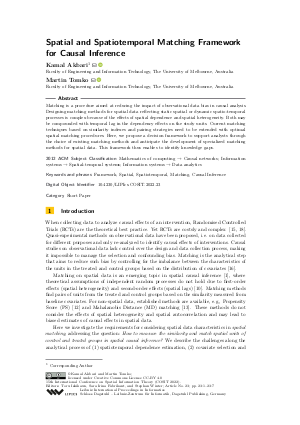Spatial and Spatiotemporal Matching Framework for Causal Inference (Short Paper)
Authors
Kamal Akbari  ,
Martin Tomko
,
Martin Tomko 
-
Part of:
Volume:
15th International Conference on Spatial Information Theory (COSIT 2022)
Part of: Series: Leibniz International Proceedings in Informatics (LIPIcs)
Part of: Conference: Conference on Spatial Information Theory (COSIT) - License:
 Creative Commons Attribution 4.0 International license
Creative Commons Attribution 4.0 International license
- Publication Date: 2022-08-22
File

PDF
LIPIcs.COSIT.2022.23.pdf
- Filesize: 0.67 MB
- 7 pages
Document Identifiers
Subject Classification
ACM Subject Classification
- Mathematics of computing → Causal networks
- Information systems → Spatial-temporal systems
- Information systems → Data analytics
Keywords
- Framework
- Spatial
- Spatiotemporal
- Matching
- Causal Inference
Metrics
- Access Statistics
-
Total Accesses (updated on a weekly basis)
0PDF Downloads0Metadata Views
Abstract
Matching is a procedure aimed at reducing the impact of observational data bias in causal analysis. Designing matching methods for spatial data reflecting static spatial or dynamic spatio-temporal processes is complex because of the effects of spatial dependence and spatial heterogeneity. Both may be compounded with temporal lag in the dependency effects on the study units. Current matching techniques based on similarity indexes and pairing strategies need to be extended with optimal spatial matching procedures. Here, we propose a decision framework to support analysts through the choice of existing matching methods and anticipate the development of specialized matching methods for spatial data. This framework thus enables to identify knowledge gaps.
Cite As Get BibTex
Kamal Akbari and Martin Tomko. Spatial and Spatiotemporal Matching Framework for Causal Inference (Short Paper). In 15th International Conference on Spatial Information Theory (COSIT 2022). Leibniz International Proceedings in Informatics (LIPIcs), Volume 240, pp. 23:1-23:7, Schloss Dagstuhl – Leibniz-Zentrum für Informatik (2022)
https://doi.org/10.4230/LIPIcs.COSIT.2022.23
BibTex
@InProceedings{akbari_et_al:LIPIcs.COSIT.2022.23,
author = {Akbari, Kamal and Tomko, Martin},
title = {{Spatial and Spatiotemporal Matching Framework for Causal Inference}},
booktitle = {15th International Conference on Spatial Information Theory (COSIT 2022)},
pages = {23:1--23:7},
series = {Leibniz International Proceedings in Informatics (LIPIcs)},
ISBN = {978-3-95977-257-0},
ISSN = {1868-8969},
year = {2022},
volume = {240},
editor = {Ishikawa, Toru and Fabrikant, Sara Irina and Winter, Stephan},
publisher = {Schloss Dagstuhl -- Leibniz-Zentrum f{\"u}r Informatik},
address = {Dagstuhl, Germany},
URL = {https://drops.dagstuhl.de/entities/document/10.4230/LIPIcs.COSIT.2022.23},
URN = {urn:nbn:de:0030-drops-169087},
doi = {10.4230/LIPIcs.COSIT.2022.23},
annote = {Keywords: Framework, Spatial, Spatiotemporal, Matching, Causal Inference}
}
Author Details
- Faculty of Engineering and Information Technology, The University of Melbourne, Australia
References
-
Kamal Akbari, Stephan Winter, and Martin Tomko. Spatial causality: A systematic review on spatial causal inference. Geographical Analysis, 2021.

-
André Luis Squarize Chagas, Rudinei Toneto, and Carlos Roberto Azzoni. A spatial propensity score matching evaluation of the social impacts of sugarcane growing on municipalities in brazil. International Regional Science Review, 35(1):48-69, 2012.

-
J. Paul Elhorst. Dynamic spatial panels: models, methods, and inferences. Journal of Geographical Systems, 14(1):5-28, 2012.

-
Bernhard K Flury and Hans Riedwyl. Standard distance in univariate and multivariate analysis. The American Statistician, 40(3):249-251, 1986.

-
Xing Sam Gu and Paul R Rosenbaum. Comparison of multivariate matching methods: Structures, distances, and algorithms. Journal of Computational and Graphical Statistics, 2(4):405-420, 1993.

-
Solmaria Halleck Vega and J Paul Elhorst. The slx model. Journal of Regional Science, 55(3):339-363, 2015.

-
Luke Keele and Dylan S. Small. Comparing covariate prioritization via matching to machine learning methods for causal inference using five empirical applications. The American Statistician, 75(4):355-363, 2021.

-
Gary King and Richard Nielsen. Why propensity scores should not be used for matching. Political Analysis, 27(4):435-454, 2019.

-
Dirk P Kroese and Zdravko I Botev. Spatial process simulation. In Stochastic geometry, spatial statistics and random fields, pages 369-404. Springer, 2015.

-
David O'Sullivan and David Unwin. Geographic information analysis. John Wiley & Sons, 2014.

-
Georgia Papadogeorgou, Christine Choirat, and Corwin M Zigler. Adjusting for unmeasured spatial confounding with distance adjusted propensity score matching. Biostatistics, 20(2):256-272, 2019.

-
Paul R Rosenbaum and Donald B Rubin. The central role of the propensity score in observational studies for causal effects. Biometrika, 70(1):41-55, 1983.

-
Donald B Rubin. Bias reduction using mahalanobis-metric matching. Biometrics, pages 293-298, 1980.

-
Donald B Rubin. Using propensity scores to help design observational studies: Application to the tobacco litigation. Health Services and Outcomes Research Methodology, 2(3):169-188, 2001.

-
Henrik Toft Sorensen, Timothy L. Lash, and Kenneth J. Rothman. Beyond randomized controlled trials: A critical comparison of trials with nonrandomized studies. Hepatology, 44(5):1075-1082, 2006.

-
Elizabeth A Stuart. Matching methods for causal inference: A review and a look forward. Statistical science: A review journal of the Institute of Mathematical Statistics, 25(1), 2010.

-
Mark W Watson. Vector autoregressions and cointegration. Handbook of econometrics, 4:2843-2915, 1994.

- Liuyi Yao, Zhixuan Chu, Sheng Li, Yaliang Li, Jing Gao, and Aidong Zhang. A survey on causal inference. ACM Trans. Knowl. Discov. Data, 15(5):74:1-74:46, 2021. URL: https://doi.org/10.1145/3444944.
